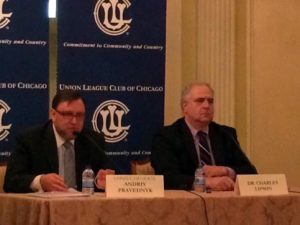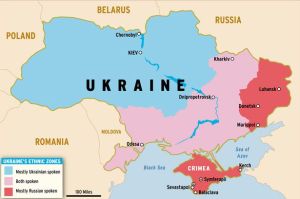
Andriy Pravednyk, Consul General of Ukraine, and Charles Lipson, University of Chicago professor, speak about the Ukrainian crisis at a breakfast sponsored by the Union League Club of Chicago Thursday, November 20, 2014.
Ukraine is not asking the U.S. for troops, Andriy Pravednyk said. “Ukraine is asking for military assistance.” The Consul General said Ukraine needs “sophisticated military equipment and weaponry” to defend against Russian troops and pro-Russian forces occupying the eastern part of the country. Russian President Putin aims to “keep Ukraine unstable, keep Ukraine weak, and keep Ukraine under Russian control,” he said.
Speaking at a breakfast Thursday sponsored by the Union League Club of Chicago, Pravednyk and Charles Lipson, an international relations professor at the University of Chicago, reflected on the Ukrainian crisis and whether Putin’s aggression can be stopped.
Russia annexed Crimea in March 2014, after funneling military support to pro-Russian separatist forces in Ukraine for months. Crimea has a significant ethnic Russian population but is internationally recognized as belonging to Ukraine.

This map explains the ethnic boundaries within Ukraine, as described by language primacy. courtesy of the mirror.co.uk
The crisis in Ukraine hits close to home for the nearly 50,000 Ukrainian Americans living in Chicago and its suburbs. But the Obama Administration has done little to support the Ukrainian resistance and is unlikely to take any real action in the near future, Lipson said.
Lipson referred to the U.S. response as “feckless and confused,” citing a lack of American foreign action. “We are not giving serious support to Ukraine. The United States is doing for Ukraine what it is doing for the Kurds, but without even the pinprick airstrikes.
“But this is a delicate problem,” Lipson acknowledged. “We need to give support to countries like Ukraine without being unnecessarily provocative and without drawing ourselves into a larger conflict.” Lipson and Pravednyk identified a need to determine an appropriate level of U.S. involvement — but both were unsure what that involvement should look like.
Pravednyk asked for more active support of Ukraine: “I am sure that Putin will go as far as we let him go. I think that the whole international community should think about how to stop Putin from doing what he’s doing right now.”
“Russia does have reasonable concerns about seeing NATO right up on its doorstep,” Lipson said, before reminding guests that the prospect of closer economic ties between Ukraine and Europe had sparked the initial revolution.
Pravednyk agreed, citing a recent statement by one of Putin’s spokesmen, which suggested that Russia is fearful of NATO expansion. “Russia was really afraid of NATO coming to Ukraine, which shows that Russia still considers NATO an enemy,” he said.
This fear lies at the core of Russian aggression in the region, Lipson said. Chief among Putin’s interests is a desire to prevent Ukraine from moving any closer to the West than it already is, both economically and militarily.
Pravednyk referred to the events of the past year as a “revolution of dignity,” meant to protect Ukraine from broad-sweeping Russian interests: “Most Ukrainians will fight if necessary. We will never let anyone steal our future.” Pravednyk said he is hopeful that Russian leadership — although likely not Putin — will find the wisdom necessary to avoid a full-scale war with Ukraine.
Putin justified sending Russian troops into Ukraine by charging that ethnic Russians living in the country were fearful for their lives. But Pravednyk said this assertion is false and blamed pro-Russian propaganda for the widely touted rumor. “The idea that all Russians are in danger of being assaulted or killed in Ukraine is simply lies.” Pravednyk said his wife is ethnically Russian and has lived in Ukraine for 25 years, but has never faced any problems because of her ethnicity.





